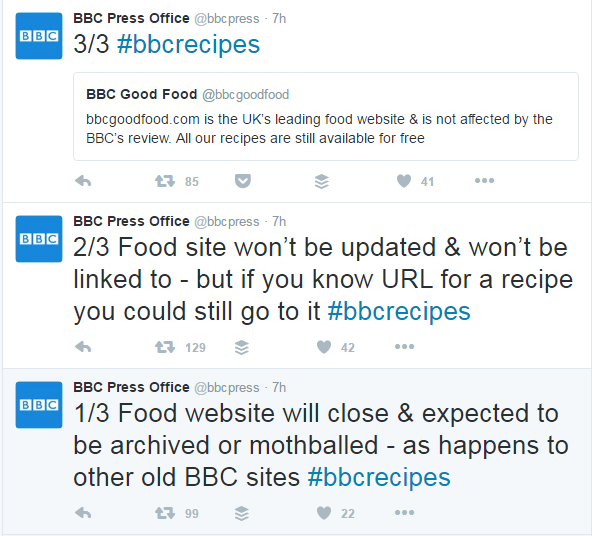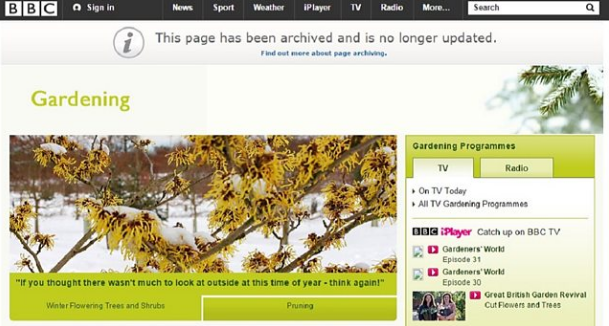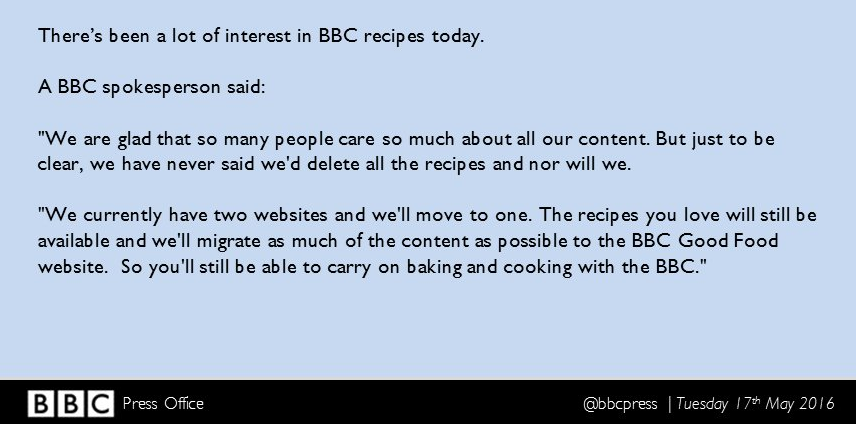The BBC are apparently removing thousands of recipes from their website. This has been announced, slightly clumsily, in a leak in early May, and then more officially by the BBC themselves.
This blog post takes a look at what happened, and ends by looking at the possible motivations that may have caused the BBC to communicate their plans in such an apparently clumsy way.
Phases of the announcement
There were 4 phases in the announcement that ‘BBC Food’ was going to be closed:
- Phase 1: A leak in early May that this was planned.
- Phase 2: The BBC announcing officially that they’ll be closing the ‘BBC Food’ site.
- Phase 3: A partial caveat, that the site will be ‘archived’ or ‘mothballed’.
- Phase 4: A very large caveat, that many of the recipes will move across to ‘BBC Good Food’.
The original story (phases 1 & 2) explained that this was happening to ‘streamline output’ and ‘save £15m’.
That didn’t really make sense, as it costs relatively little to keep pre-existing content on a website and, naturally, people became quite angry about this. The BBC is funded by taxpayers, and license fee payers, who asked why the content they’d funded was being removed.
Mothballing?
After lots of anger about the closing of ‘BBC Food’, they put out a clarification (‘phase 3’) above. Here’s how that was communicated by their Press Office on Twitter:

You’ll note the words ‘archived’ and ‘mothballed’ in there. Neither of those sound particularly friendly to the general public. The announcement was designed (presumably) to quell the anger of all those asking why it was being closed. By using internal jargon, it cleared up very little & simply prompted more anger & questions.
Looking at what the BBC normally do when they ‘mothball’ something, this probably would not mean that they would hide all of the recipes from Google search. It also likely does not mean they’d stick around for a short time before being deleted (there is BBC content many years old still sat there ‘mothballed’). It more likely means that the content would be excluded from the BBC’s own website search function, and that a ‘This page has been archived’ header would be tacked onto the pages:

There are exceptions to this – for example, when closing ‘bbcshop.com’, they removed the entire site & redirected users across to its replacement but, in general, they do the above: Add an ‘archive’ tag, leave it available in Google search, remove it from their own search results, and leave it to sit there accessible by the public if they try hard to find it.
The Final Clarification
Despite their ‘archiving’ announcement, people continued to be angry, and a petition to ‘save’ the site hit more than 100,000 signatures. In response, the BBC clarified still further:

The Possible Motivation
The obvious question is: Why didn’t they put out a straightforward announcement in the beginning. Surely they would have seen that “We’re moving most of the content from one of our sites to another” would prompt less backlash from their users than “we’re shutting down”.
It’s possible that what’s happening is this:
- The ‘BBC Food’ section of the overall BBC site competes with ‘BBC Good Food’, which is a completely separate website.
- ‘BBC Good Food’ is part of BBC Worldwide, the commercial arm of the BBC which is charged with maximising profit inn order to help fund the overall BBC. BBC Worldwide is a £1bn+ company, which generated just under £140m profit last year, and passed £226m across to the parent organisation (ie. theoretically keeping the license fee down).
- If the BBC close ‘BBC Food’, and migrate the most valuable content across to ‘BBC Good Food’, this increases the likelihood of them making profit.
So why did the BBC simply announce that they were closing ‘BBC Food’, without explaining that they’d be moving content across to ‘BBC Good Food’?
- Option A: It’s possible this was simply an accident – a clumsily worded announcement.
- Option B: It’s also possible that they do not quite know what’s going on themselves – they recognise they have 2 areas covering the same thing, and that the most obvious one to close is the taxpayer funded one, but they haven’t fully planned things out.
- Option C: Most likely, I think, is that part of the messaging around the whole announcement was that they are closing to avoid competing directly with commercial organisations. If they had announced at the beginning that they’d be shifting taxpayer funded content across to their own commercial organisation, that puts a very negative spin on things, and would likely raise some complaints from commercial competitors.
Summary:
- It’s likely BBC Food will stay around for a little while, with an ‘archive’ note at the top of pages.
- Likely, longer-term, they will shift most/all of the content (or at least the most valuable, heavily accessed content) across to BBC Good Food.
- In shifting that content, they are essentially moving ‘non-profit making’ content across to an area that’s very happy to make profit (in fact it is its primary motive). And, of course they also remove their own ‘regular’ site from competing against their commercial site.
- All of the fuss among the general public could likely have been avoided by communicating this differently, but in doing so they’d likely have stoked a lot of anger among other newspapers, publishers, and other commercial organisations.
By choosing a “disruptive comms” strategy they have gained masses of publicity that has run over a period of time. Would be interested to see the increased click data for both of the recipe websites. A simple notification would not have generated the noise across so many media outlets as well as this strategy.
Yeah, seems like they haven’t handled it that well… Or perhaps they were using it as a way to advertise the Good Food site to those that weren’t aware of it – thus moving all those loyal subscribers over to their money-generating site from their non-profit one.